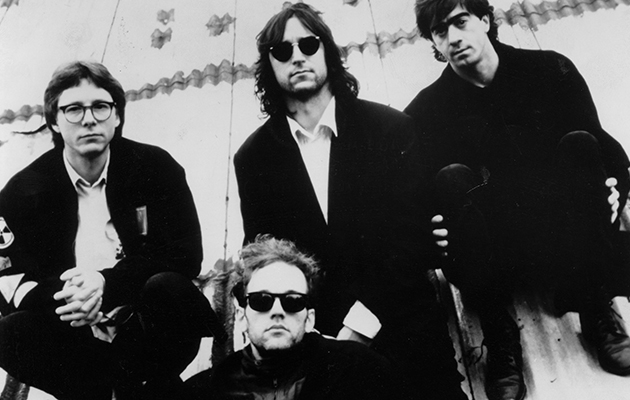David Stubbs invites Peter Buck, Mike Mills and Michael Stipe to talk about the 20 greatest singles of their major-label era. But which one does Stipe find “gross and disgusting”? And why does Mills think, “It’s amazing how many songs we’re playing now that we could have written yesterday�...
2 DRIVE
From the 1992 album Automatic For The People. Released: September 1992.
Chart positions: UK No 11, US No 28
http://www.youtube.com/watch?v=xQN7A6Vl1H4
“Drive” is a dirge, certainly, but it’s among rock’s finest. Funereal in pace yet thunderous in impact, it feels like the last raging testament of rock’n’roll before its anger is spent. A pessimistic and downbeat counterpart to tracks like “The Sidewinder Sleeps Tonite” and the balm of “Everybody Hurts”, it occurred at a particularly weather-beaten moment, after 12 long years of Republicanism in the US, of being “Bushwhacked”. It also came at a moment when rock music was in its last throes of innovation and dominance, something Stipe senses when he sings, “Maybe you rocked around the clock”. Some 11 years on, it’s become clear that rock music’s ability to reinvent itself and reassert its centrality in people’s lives is all but defunct – meanwhile, here we are again with another Bush in charge and dealing with the burning after-effects of another Iraq war.
MIKE MILLS: It’s amazing how many songs we’re playing now that we could have written yesterday – “Welcome To The Occupation”, “Exhuming McCarthy”, a lot of these songs that we’re playing, they’re as relevant today as they ever were. And that’s certainly true of “Drive”. Literally, another Bush, another Iraq war. But it just goes to show that no-one ever went broke underestimating the intelligence of the American people.
MICHAEL STIPE: We played that song the other night, and I was really shocked, I thought it was going to fall as flat as a pancake, but people really love that song in the UK. It works, and not just on the lyrical level, which people aren’t going to be reading into in a live situation.
PETER BUCK: We definitely wanted that as a first single because it really represented Automatic For The People well, and it certainly wasn’t “Shiny Happy People”. We had put a lot of poppy stuff out on singles, and “Drive” was kind of dark. Nowadays, marketing people tell you that, unless maybe you’re, say, Mariah Carey in her prime, you only get one shot at a single so you’d better go with your best shot. Back then, the idea was to put out something that would get radio play and then you’d follow up with the real hit when the album came out.
MICHAEL STIPE: I was obsessed with the idea of radio as being the only conduit for anyone who was young and an outsider – back at a time when the internet didn’t exist and there weren’t magazines that catered to those needs. And yet radio continued to suck, to be this sucking black hole. Also, there’s a tip of the hat to David Essex there, a homage to one of my favourite songs of all time, “Rock On”.
PETER BUCK: There was a feeling at that time that rock’n’roll, the spirit of adventure, was something you just weren’t seeing. I mean, you had great records, I enjoyed the Nirvana era and even Guns N’ Roses. But I remember thinking, we’re really not going to see rock’n’roll records dominating the charts any more for much longer. In a way, I feel things have come back round to the way they were in the ’50s when on the old Ed Sullivan Show you’d have The Rolling Stones and The Beatles on it, but then you’d have a troupe of Hungarian gymnasts. Literally. And a guy spinning plates. I thought rock’n’roll was going to kill that whole concept of loveable entertainment, it was going to be about saying what you mean, mean what you say – but loveable entertainment is totally back. Dance steps, choreography schools, getting your teeth capped, get a weave if your hair’s going, smile all the time. There’s a place for that, but I always hoped that rock’n’roll would push entertainment into a different area, that it’d be more about a shared sense of meaning in your life. But no, it’s all back.



